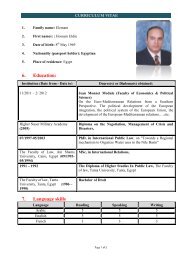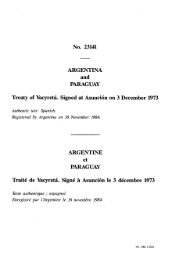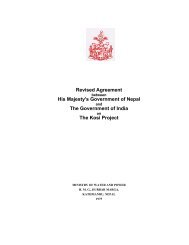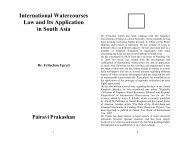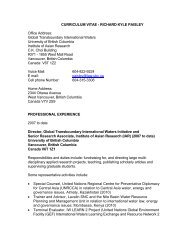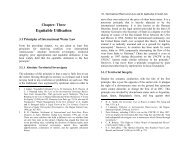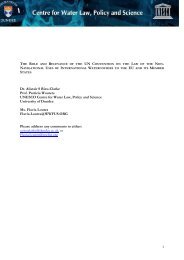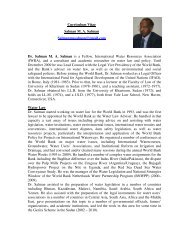Upreti, Trilochan, International Watercourses Law and Its Application ...
Upreti, Trilochan, International Watercourses Law and Its Application ...
Upreti, Trilochan, International Watercourses Law and Its Application ...
You also want an ePaper? Increase the reach of your titles
YUMPU automatically turns print PDFs into web optimized ePapers that Google loves.
Equitable Utilisation / 141 142 / <strong>International</strong> <strong>Watercourses</strong> <strong>Law</strong> <strong>and</strong> <strong>Its</strong> <strong>Application</strong> in South Asiaaffording judges a measure of discretion, within a flexiblestructure <strong>and</strong> commensurate with the uniqueness of eachdispute of scarce resource allocation. As will be illustratedbelow, the ICJ has advocated the formula for equitable results<strong>and</strong> equitable sharing in the interpretation of equitableutilisation. It has been said that without the principle of equity,the allocation <strong>and</strong> sharing of such resources is not possible, <strong>and</strong>a great disaster of conflicts has been prevented by itsapplication. So far, three models of equitable allocation haveemerged to this end. 109 The first model is that of correctiveequity, <strong>and</strong> the second that of broadly conceived equity. Bothof these models displace strict law but are still rule based,evolving into a set of principles for the accomplishment ofequitable allocation. The third model of common heritageequity sets out rules for the exploitation of resources byensuring the conservation of humankind’s common patrimony.<strong>Application</strong> of equity in this area will make it easy tounderst<strong>and</strong> <strong>and</strong> apply equity in IWL.3.7.1 Corrective Equity in Trading ArrangementsCorrective equity has played a substantial role in providingjudicious treatment <strong>and</strong> justice to all nations. It seeks to providefairness in the sharing of resources underneath the sea, thecontinental shelf <strong>and</strong> from the open sea. 110 The use of equityhas been long executed in order to get a fair benefit <strong>and</strong>protecting the interests of developing nations in internationaltrade <strong>and</strong> commerce area. Similarly, it seeks to protect the rightof developing nations in the international trading system,within the framework of GATT (now WTO), by providing thebasic rules of world trade. 111 The GATT includes a mechanismfor a generalised system of preference (GSP) in order tointroduce the notion of fairness into the international trading109 Supra note 69, p. 572.110 Ibid.111 Ibid. See GATT document in 55 UNTS, (1947) p. 187.regime. The other provision is that of the Most FavouredNations (MFN) clause, which guards against any negativeimpact of trade on the legitimate rights of developing nations.The Lome Convention 112 sought to inject equity into the globalcommodity market to protect the interests of developing <strong>and</strong>weak nations through the creation of a compulsory fund for thestabilization of export earning called STABEX. Under thissystem, a country is eligible for the international stabilisation ofthe price of a product representing at least 5% of its total exportearnings in the year preceding the application for STABEXassistance. Such export earnings from the product must drop atleast 4.5% from the average value calculated over a six-yearreference period for STABEX aid to become operative. 113 Fromthe point of view of protecting the interests of developing <strong>and</strong>weak nations, the above mentioned arrangements areparamount in promoting the integration <strong>and</strong> participation ofnations in a fairer international trade system. Equity is at itsheart. The European Union <strong>and</strong> the US have provided specialrights <strong>and</strong> facilities to developing nations as trading partners. 114Hence, the notion of equity favours weak <strong>and</strong> vulnerablenations that are not fully able to compete in the internationalarena. 115 Special consideration is given to such nations in orderto safeguard their interests, <strong>and</strong> this concept can be utilised inIWL issues by providing priority to the poorest countries. In the112 Supra note 69, p. 573-574.113 There are four versions of the Convention, i.e., Lome I, II, III, IV, forthe enhancement of fairer trading regime.114 Ibid. Also see Fourth ACP-EEC Convention <strong>and</strong> Final Act in 29 ILM(1989), p. 783.115 “The EU has provided special quotas for sugar exports from the leastdeveloped states”, The Rising Nepal, August 9, (2002); also see staff,“Trade is Aid” The Kathm<strong>and</strong>u Post 25 February, 2003. The UnitedStates has provided 38 sub-Saharan African states a duty free quota ontheir exports of Apparels <strong>and</strong> Textile Products under the provision ofthe African Growth <strong>and</strong> Opportunity Act, 2000. Nepal is alsoexpecting such facility on its garments in the US market <strong>and</strong> Australiahas made its market duty free <strong>and</strong> quota free for 49 l<strong>and</strong>lockedcountries <strong>and</strong> East Timor from June 2003.



